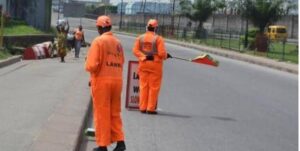
This follows a protest by a Lagos street sweeper over harsh working conditions, low salaries, lack of health coverage, and other concerns.
The Lagos State Waste Management Authority (LAWMA) has defended its N40,000 monthly payment to street sweepers in the state.
This follows a protest by a Lagos street sweeper over harsh working conditions, low salaries, lack of health coverage, and other concerns.
LAWMA shared its position in a statement issued on Thursday, signed by the authority’s management and shared by the Senior Special Assistant to the Lagos State Governor on New Media, Jubril Gawat.
The agency emphasised that street sweepers are engaged through private companies, with their entitlements “clearly defined.”
“Street sweepers are engaged through private companies under structured contracts, with their responsibilities and entitlements clearly defined. These private companies are responsible for directly paying their engaged sweepers,” the statement said.
LAWMA also stated that a recent wage review had adjusted payments for street sweepers.
“Following a recent wage review, sweeper salaries have been adjusted to align with the national minimum wage and are proportionate to their work schedule, which consists of four-hour daily shifts. Under this structure, sweepers earn N40,000 per month, and supervisors earn N50,000 per month,” it said.
While it is uncertain if the wage review took into account the Nigerian government’s approved N70,000 minimum wage, the Lagos State government defended its compensation, highlighting that street sweepers work four-hour daily shifts.
LAWMA maintained that the new “arrangement provides workers with financial stability while allowing flexibility for other economic activities outside their assigned shifts.”
The statement further claims that LAWMA has implemented several measures to improve workers’ welfare, including “regular health and safety training to ensure best practices in the sweepers’ daily operations,” “reclassification of sweeping routes to prioritise worker safety and security,” “accident and emergency insurance coverage to provide medical support in case of work-related incidents,” and “provision of uniforms and necessary work implements to ensure dignity and efficiency in their duties.”
The agency, however, vowed to investigate any “reports of salary discrepancies or contractual violations” and ensure that “corrective measures are enforced where necessary.”
